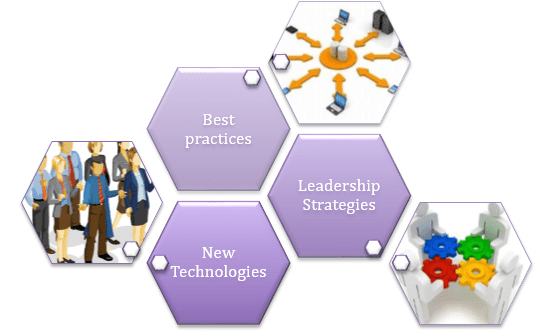Have you heard of “China’s Sorrow?”
A yellow river flowing from Kansu to Shantung is called Hwang Ho. The name yellow comes from the silt-like loess which it carries in suspension and which likewise gives its name to the sea into which it flows. The river-borne loess is both – a prosperity and a disaster. The alluvial plains of the Hwang Ho are of extraordinary fertility; but in its lower course the, aggrading stream periodically breaks its banks, devastating the surrounding country and earning, “China’s Sorrow.”
Does this changing course, productivity, breaking banks sound similar in business parlance? For some, Yes.
Before you start looking critically at your business and start qualifying your digital initiatives to create more value than it could ever capture; you would be one of 93% executives who couldn’t launch new businesses around company’s digital initiatives. If you look at the business and its course in last decade, the changes in business landscape are backed by Disruption in business models.
These disruptions quite often starts with capturing end customers attention with cheaper alternatives and then gradually utilizing technology for scalability or creating faster response mechanism to competition. With the generational change, we are getting accustomed to seeing mature products getting wiped out by new technologies and to ever-shorter product lifecycles.
Key Sources of Disruption in today’s business are
- Technological advancements
- Evolving Customer demand, and
- Rapidly Changing marketplace
In this new world order of extreme interconnectedness and strategic paralysis – the “disruptors” are new “innovators”. Since, most of these disruptions are unplanned and unintentional; there’s a need for strategic rethinking about Innovations.
Digital Transformation is to create opportunities for innovation without any disruption to business using new technologies, leadership strategies and best practices.

Resultant current trends in the industry include
- Digital transformation
- Even more influence of Social media
- Big data and Convergence of big data with consumer data
- Predictive analytics
- The hybrid cloud is the true cloud
- Collaboration in business context
- Mobile wearable technology transforming businesses
- Internet of Things
- Need of the Platform and orchestration
- The Networked Economy, etc.
As a service provider, you have entire eleven yards as opportunity of building a Digital practice to help customers run their business more efficiently. As digital transformation throws the complex challenge of where to start, Digital Practice for system integrators (SIs) can be initiated with one of the existing big technology platforms, say SAP, as the base and subsequently extended to other technologies / platforms. The Practice Structure should facilitate productized services around (but not limited to)
- Cloud (Virtualization etc.)
- Mobility
- Analytics
- SAP HANA Platform
- Big Data
- Internet of Things
- SAP Business Suite
- User Experience
- Customer Engagement and CRM
- Business Networks
- Security, Data Protection and Privacy
Building SI Digital to be centered around:
- Approach: Short / medium / Long term (Which item to pick when and how to build the integrated capabilities over a period of 6-12-24-36 months)
- Leveraging the existing SI capabilities – Industries, Customers, Geographies, Platforms (SAP etc.)
- Focusing on the industries more affected by Digitization (Retail, Banking, Publishing etc.)
- Hiring and Continuous Cross-skilling, Training Plan (Very critical)
- Piloting to show case capabilities
- Collaborating with the Product vendors / Partners (SAP etc.)
- Business Model for Digital Practice (e.g., Subscription based pricing model)
- Productization of end-to-end on-demand (SaaS, PaaS, IaaS) and existing on-premise services
- Marketing and Sales Plan
- Representation in industry events (SAPHIRE etc.)
- Best Practices
- Tools and processes tailored to suit the advancements in technologies
- Leadership and Strategy for Digitization
- Delivery Model (Onshore-Offsite-Offshore) and role mixes
Full-blown SI Digital Services portfolio may include the following offerings:
1. Roadmap Definition for Digitization (keeping the current assets and landscape in mind)
2. Digital Strategy Definition
- Digital Health Check (Digitization Feasibility Study, Digital Maturity check)
- Digital Strategy
- Digital Transformation
- Continuous improvement Plan
3. Digital Innovation and Product Development
- Digital Business models and proposition
- Digital Innovation management
4. Digital Value Chain and Operations
- Digital Value Chain
- Digital Manufacturing Operation
- Digital Productized Service Operations
5. Digital marketing, sales and service
- Digital Customer Analytics
- Digital marketing
- Digital commerce
6. Digital Workplace and shared services
- Digital Workplace and infrastructure services
- Digital Shared services
With more and more CIOs looking at digitalization as an obvious way to go, system integrators have no other way than to build this capability to survive in the industry. This piece is a small attempt to list down the high level guiding steps towards the creation of a Digital Transformation practice for any SI. World of reality demands much more!
About Author:
Sushil is Coach, Mentor, Advisor and Partner at 366Pi Consulting. He specializes in building and managing large organizations and delivery teams (of over 1000 people). His acumen towards Strategy definition and execution for the organizations has helped him exceed in multi-role across his 20-years career. He is currently helping his clients around strategizing and building successful IT and Shared Services Organization, Digital Transformation, IT Operations, Leadership Development, Technology Consulting etc. He has huge penchant for academic activities and his strength lies in designing programs for management and leadership Learning & Development, and delivering it. He has successfully groomed over 100 leaders across his career as part of the succession planning under the span and control or otherwise.
You can contact author here: Sushil (at) 366Pi (dot) com.
366Pi Digital-o-nomics helps clients adopting Digital Business and build capabilities across organization. And, what makes us unique is our presence on technology domain, especially cloud based, through our partner organization 366Pi Technologies. Our business, management, and technology expertise helps us analyze a business 360 degrees around digital economy. We focus on key areas critical to your business success, optimize sales productivity, transformational customer experience, and innovative business models.


